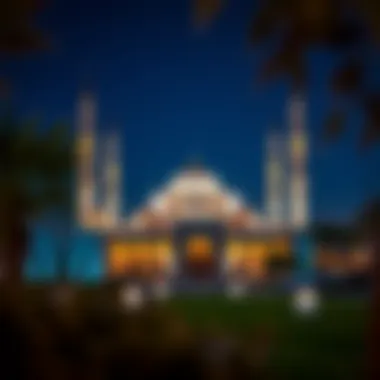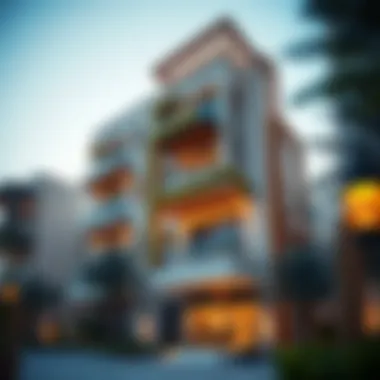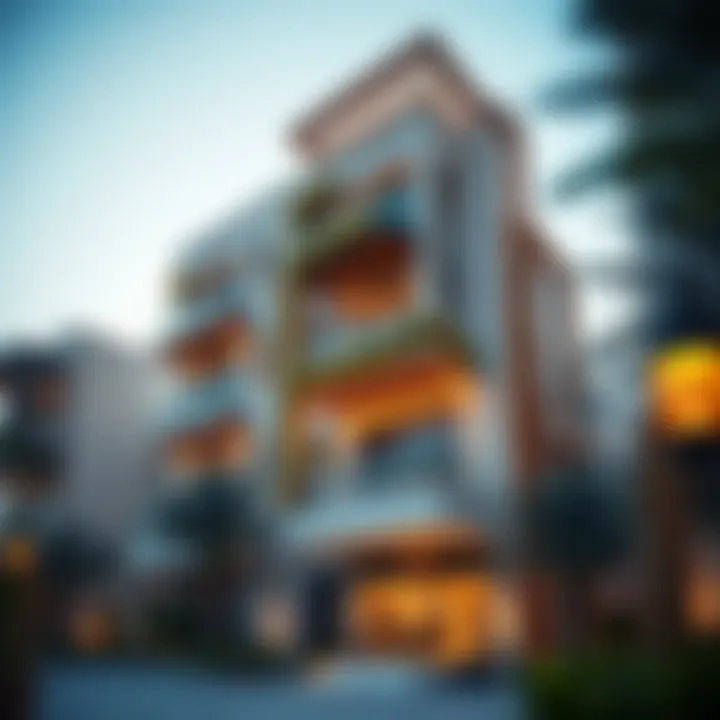Ramadan 2023: Cultural Insights and UAE Real Estate Trends


Intro
Ramadan, the holy month of fasting and reflection, has an unparalleled cultural significance in the UAE, especially in 2023. The rhythm of life shifts; the city transforms, and daily routines adapt to the spiritual and communal aspects of this time. For investors, homebuyers, and real estate agents alike, understanding the impact of Ramadan on the market dynamics is crucial. It isn't just about the spirituality; it’s a complex interplay of religious observance and economic activity.
Market Trends
The real estate market in the UAE doesn’t just pause during Ramadan. Instead, it evolves, often in unexpected ways. Let’s dive deeper into the current market analysis and what the future might hold.
Current Market Analysis
As fasting begins, one might anticipate a slowdown in buying dynamics; however, history reveals a different scenario. Real estate activities continue, albeit influenced heavily by cultural practices.
In 2023, Dubai's real estate sector has seen:
- An increase in short-term rentals: Many expatriates and local residents seek temporary housing during Ramadan, especially as they host family and friends.
- Heightened interest in community spaces: Areas like Downtown Dubai and Jumeirah are witnessing a spike in inquiries, as families want proximity to mosques and communal Iftars.
- Boost in property investments: Investors are keen on securing properties that cater to the growing demand for blended living, where residential setups accommodate both long-term and short-term tenants.
"Ramadan isn’t just a break from daily routines; it’s a catalyst for community and economic engagement in the real estate market."
Future Projections
Looking ahead, the trends suggest that Ramadan will continue to reshape consumer behavior in the real estate scene. Projections indicate:
- Continued rise in mixed-use developments: These urban spaces cater to residential, retail, and leisure needs, which are especially appealing during Ramadan.
- Focus on sustainability: Properties that offer energy efficiency and eco-friendly solutions are becoming more desirable.
- Shift towards community-focused developments: Consumers are leaning towards neighborhoods fostering connection and shared experiences during Ramadan, like parks and cultural spaces.
Property Insights
Understanding how different properties serve diverse needs during Ramadan is paramount to navigating the market effectively.
Neighborhood Comparisons
Several neighborhoods stand out during Ramadan:
- Dubai Marina: Known for its vibrant lifestyle, it attracts expatriates looking to celebrate the month with relatives.
- Al Barsha: Offers affordable accommodations with close proximity to mosques and community events.
- Downtown Dubai: Attracting high-net-worth individuals, this area’s allure increases with its luxurious offerings and accessibility to key landmarks.
Property Types Explained
Navigating through various property types can be overwhelming, but clarity can aid decision-making:
- Apartments: Ideal for both short-term and long-term stays, especially in bustling neighborhoods.
- Villas: Often sought after for families wanting spacious living with private amenities.
- Townhouses: A middle ground, providing connectivity to communities with some private space.
Real estate dynamics during Ramadan encapsulate a unique blend of culture and commerce. By recognizing the influence of this holy month, stakeholders can position themselves favorably in a market that thrives on community and cultural appreciation.
Preface to Ramadan in the UAE
Ramadan holds a unique place in the cultural and social fabric of the UAE, weaving together rich traditions and modern practices that define this holy month. For investors, homebuyers, agents, and analysts, understanding this period is critical, as it significantly shapes consumer behavior, community engagement, and even real estate dynamics. Knowing how Ramadan influences various sectors can aid in making informed decisions, whether in extending leases, investing in new properties, or engaging with clients.
Historical Context
Ramadan has been observed for centuries by Muslims worldwide, and in the UAE, its significance is deeply rooted. Historically, the month has marked important events and reflections. The practice of fasting during daylight hours encourages individuals to demonstrate devotion, patience, and community spirit. It is essential to acknowledge that the UAE has transformed immensely from its Bedouin origins to a rising global hub, yet the value placed on Ramadan remains unwavering. During this month, the focus shifts from daily business to more spiritual pursuits, creating a rhythm of life that is both unique and challenging.
As the UAE becomes more cosmopolitan, the ways in which Ramadan is celebrated also adapt. Different emirates may have localized customs that honor this period, reflecting both unity and diversity in cultural practices. Yet, the fundamental customs like the suhoor and iftar meals serve as a reminder of the month’s core values, fostering family bonds and community ties.
Significance of the Month
The significance of Ramadan transcends mere fasting; it is a time for reflection, self-improvement, and spiritual growth. As the sun sets after a long day, families gather to break their fast with iftar, a communal meal that serves as both nourishment and social glue. In homes and mosques across the emirates, the communal atmosphere is palpable.
Moreover, Ramadan acts as a catalyst for charitable giving, with many engaging in acts of kindness, contributing to local charities or preparing food for those in need. This spirit of generosity is prevalent among both residents and expatriates, reinforcing the importance of community.
Economically, Ramadan is a double-edged sword. While it prompts a spike in demand for food, hospitality, and retail services, it also encourages businesses to adapt to the altered pace of life. Many businesses adjust their hours to accommodate fasting schedules, affecting foot traffic and sales patterns. For real estate professionals, this can be crucial, as planning around these trends may provide opportunities during this sacred month.
Both historical context and the month’s significance help paint a broad picture of Ramadan's importance in the UAE. Grasping these factors allows investors and agents to navigate the evolving market dynamics that emerge during this unique period.


Impact of Ramadan on Daily Life
Ramadan stands as an influential period in the UAE, presenting a unique tapestry of cultural practices and community interactions. The impact of this holy month resonates deeply within daily life, transforming routines and behaviors. Understanding these shifts is not just valuable for visitors or residents; it’s essential for agents and investors navigating the complexities of the real estate market during this time. The cultural significance, observed eating practices, spiritual reflections, and social engagements all play a role in shaping the living experience in the UAE.
Eating and Fasting Practices
During Ramadan, the act of fasting is an integral part of the cultural fabric, dictating the rhythm of daily life. Muslims abstain from food and drink from sunrise to sunset. This act goes beyond mere dietary restrictions; it's a time for self-discipline, reflection, and unity.
Iftar, the meal breaking the fast, emerges as a cherished gathering. Families come together, sharing delectable dishes that symbolize generosity. Homes and restaurants become lively as the sun sets, and elaborate feasts are prepared. Traditional meals like harees and dates can be seen gracing tables, inviting neighbors and friends to partake in the spirit of togetherness.
Suhur, the pre-dawn meal, holds its importance too. Often, it consists of lighter foods designed to sustain energy levels throughout the day. This practice encourages early rising, making sleep schedules shift, which in turn impacts the productivity in workplaces and businesses.
"Fasting, during Ramadan, is not just a physical fast but a means to cleanse the heart and spirit, fostering empathy and compassion."
Prayer and Spiritual Reflections
The daily routine also adapts around increased prayer and spiritual reflection. The five daily prayers transform significantly during Ramadan, seeing an increase in attendance at mosques. One of the pivotal moments is the Taraweeh, the special prayers held at night after the Isha prayer. These sessions often draw large crowds, fostering a sense of community and spiritual rejuvenation.
The nights of Ramadan serve as gateways for individuals to deepen their understanding of spirituality. Reading the Quran and engaging in personal reflection becomes a focal point. For many, this period is marked by introspection, exploring personal faith. It’s not uncommon for discussions on spiritual growth to permeate the local coffee shops and other social spaces throughout the month.
Social Interactions
Social life experiences a noteworthy transformation during Ramadan. The essence of community is palpable, from sharing meals to attending nightly prayers. It’s a time when people make a conscious effort to reach out, maintain relationships, and reconnect with family. This shift is seen as a collective effort to strengthen bonds and enhance social ties.
Festivals and events flourish, catering to families and communities looking to celebrate together. Markets bustled with life, from shopping for iftar essentials to enjoying shared activities. Special Ramadan tents pop up across urban spaces, offering curated experiences that bring people together.
For investors and real estate agents, recognizing this vibrant social culture is vital. Businesses catering to food and hospitality thrive, while the demand for community-oriented spaces increases. Understanding social changes can provide insights into real estate investment opportunities, informing decisions on commercial and residential properties.
The impact of Ramadan on daily life in the UAE creates an intricate web of cultural significance, shaping not just personal routines but also influencing economic and social dynamics in the property market. As the month progresses, these adaptations reflect the values and traditions that define life in the Emirates.
Ramadan Festivals and Events
Ramadan, a month of fasting, prayer, and reflection, is also a time of gatherings and celebrations across the UAE. The array of festivals and events that occur during this holy month enhances community spirit and emphasizes cultural significance. These gatherings provide opportunities for people to come together, creating an atmosphere of unity and shared purpose. Individuals and families often take part in festivities, contributing to a sense of belonging within their communities.
Major City Events
In 2023, major cities in the UAE, particularly Dubai and Abu Dhabi, brimming with vibrant energy, host various events that celebrate Ramadan. These events cater to both residents and visitors, showcasing the rich cultural tapestry of the region. For instance, the Ramadan Night Market in Dubai has gained popularity as a family-friendly event. It features a plethora of food stalls, local crafts, and live performances. Here, families can stroll through the stalls, savoring traditional dishes such as biryani and samosas while browsing handcrafted items.
Such events not only provide entertainment but also promote local businesses, allowing small vendors to thrive in a lively, festive environment. Additionally, communal Iftar gatherings are organized in many parks and public spaces where families and friends break their fast together, reinforcing social bonds.
Community Activities and Initiatives
In 2023, community initiatives take center stage, reflecting the charitable essence of Ramadan. Local organizations and mosques frequently undertake campaigns that focus on helping those in need. This year, initiatives like food drives and charity events have become integral to the cultural landscape of Ramadan.
Many groups collaborate to prepare and distribute Iftar meals to those who cannot afford them. Such efforts not only embody the spirit of giving but also exemplify community solidarity. Examples include organized volunteers setting up tents in various neighborhoods, providing not only meals but also comfort to those less fortunate.
Moreover, educational workshops and storytelling sessions focused on the values of Ramadan can be found in different community centers throughout the UAE. These activities offer valuable opportunities for children to learn about the significance of Ramadan, often using engaging formats to make the lessons resonate more effectively.
"The essence of Ramadan is in giving, sharing, and connecting with one another. It provides a canvas where threads of tradition and modern living weave together to create a unique tapestry of community spirit."
Through these activities, the community comes alive with vibrance during Ramadan. The festivals and events form a more profound connection to the culture and traditions of the UAE, making this month not only spiritually significant but also culturally enriching for all who partake in the experience.
Economic Aspects of Ramadan
The significance of Ramadan transcends mere spiritual reflection; it weaves itself into the economic fabric of the UAE. This month serves as a fulcrum not just for religious observance, but also for robust economic activity. Understanding the economic nuances during Ramadan is crucial for stakeholders in real estate, retail, and hospitality sectors. This section delves into consumer behavior trends and the adjustments businesses make to meet Ramadan's unique demands.
Consumer Behavior Trends
Every year, Ramadan generates notable shifts in consumer behavior, driven by the customs and practices inherent to the month. Analysis shows that spending habits evolve significantly as the faithful engage in fasting, charity, and communal meals.
- Increased Spending: As preparations for Iftar meals begin, families allocate budgets for larger grocery purchases. This spike in demand influences local markets and grocery retailers.
- E-commerce Explosion: Many consumers turn to online shopping as they seek convenience amid the busyness of Ramadan. This is particularly evident in electronics, clothing, and food delivery services, where sales soar as many seek to enrich their Ramadan experience.
- Cultural Gifts and Charity: Ramadan emphasizes generosity, leading to increased spending on gifts and donations. Factors like Zakat, or almsgiving, become pivotal as communities focus on supporting the less fortunate, which in turn boosts overall spending.


A recent survey indicates that consumers surveyed planned to spend 20% more this Ramadan compared to previous years, highlighting a clear upward trend in economic activities linked to the holy month.
Retail and Hospitality Adjustments
In the hospitality sector, Ramadan necessitates strategic adjustments to cater to the changes in consumer habits and preferences.
- Tailored Offerings: Restaurants and hotels often introduce special Iftar and Suhoor menus to attract guests. These offerings not only include traditional dishes but also cater to diverse palates that reflect the multicultural makeup of the UAE.
- Extended Hours and Promotions: Retailers adapt by extending operating hours to accommodate shoppers during both daytime fasting and nighttime celebrations. Exclusive promotions during Ramadan can see considerable success as businesses aim to draw in foot traffic.
- Event Sponsorship: Many businesses opt for sponsorship opportunities, such as community events or charitable work, to enhance their visibility during this month of goodwill. Associating their brand with community values fosters positive consumer perceptions, translating into loyalty.
"Ramadan is not just about fasting; it’s a period that stirs economic engagement like no other in the calendar year."
Understanding these economic aspects of Ramadan is vital for investors and businesses aiming for success in the UAE market during this period. The intersections between spirituality and commerce unveil unique opportunities for engagement and growth, addressing both community needs and economic interests.
Real Estate Market Dynamics During Ramadan
The holy month of Ramadan holds a unique place in the cultural and economic framework of the UAE. Understanding the real estate market dynamics during this period is crucial for investors, homebuyers, and agents alike. The essence of Ramadan goes beyond just spirituality; it permeates the economic landscape and influences consumer behavior, particularly in real estate. This section will delve into how the month affects rental markets and long-term investment strategies, generating insights essential for navigating property dealings during this significant time.
Short-Term Rental Market Changes
During Ramadan, the short-term rental market experiences some notable changes. With the influx of visiting family members and expatriates returning home, demand for temporary accommodations often surges. Cities like Dubai and Abu Dhabi see a variety of properties shifting from long-term to short-term rentals to take advantage of this increased interest.
A few factors come into play here:
- Increased Tourist Traffic: Ramadan attracts numerous visitors seeking to experience the UAE’s rich cultural heritage. Many of these visitors are looking for temporary housing options that provide them with comfort and convenience.
- Flexible Pricing Strategies: Landlords often adjust their pricing in anticipation of higher demand. Some may charge premium rates for properties near key religious sites or popular social events during the month.
- Unique Property Features: Rentals with amenities like iftar meals or proximity to mosques tend to attract more attention. Clients may put extra consideration into whether the property aligns with their cultural needs during this sensitive period.
“Short-term rental demand spikes during Ramadan as families and visitors gather, impacting how agents approach the market.”
As the month progresses, landlords and property managers must therefore remain adaptable. Those who can spot the trends early can capitalize on the potential profitability of short-term leases, ensuring their properties remain occupied.
Long-Term Investment Considerations
While Ramadan may influence short-term rental demand, it also provides a unique opportunity to rethink long-term investment strategies. Investors often view this month as a time of reflection, not just spiritually but financially, prompting a critical assessment of their portfolios. Here’s how:
- Market Stability Assessment: Ramadan is a time when several real estate reports and analyses come out. Investors often leverage this information to gauge market stability, understanding how changes in demand and consumer behavior impact property values over time.
- Strategic Buying Decisions: Educated investors use Ramadan to their advantage by anticipating market trends post-holiday season. With fewer competitive buyers active in the market, savvy investors can strike deals they might not get at other times of the year.
- Cultural Sensitivity in Negotiations: During Ramadan, discussions around property leases or purchases may be approached with heightened cultural awareness. A respectful understanding of how the holy month influences daily life can facilitate smoother negotiations, leading to better deals for both buyers and sellers.
Long-term investors should also consider this time as a chance to build relationships with property management companies and local agents. Developing rapport during Ramadan can yield fruitful partnerships that extend well beyond the conscious period of fasting.
For further insights and a more extensive look into the cultural significance of Ramadan in shaping economic landscapes, resources like Wikipedia and Britannica provide useful background information.
Cultural Sensitivity in Real Estate Practices
Understanding cultural sensitivity in real estate isn't just a nicety; it's a necessity, particularly during Ramadan in the UAE. This holy month brings about unique challenges and opportunities for those engaged in the real estate sector. Developers, agents, and investors must adapt to not only the buyer’s mindset but also the broader cultural nuances that define the month. Being sensitive to the rituals and practices of Ramadan can significantly affect business success, creating a respectful and inviting environment for clients.
The Ramadan period sees a marked shift in both consumer behavior and social interactions. For example, the act of fasting influences daily schedules. People often have different priorities, tending to focus on family gatherings and community events after breaking fast. This shift means that property viewings, meetings, and open houses might not attract the usual foot traffic they would during other months. Agents need to be mindful of these changes, adjusting schedules to accommodate the preferences of potential buyers.
Adaptation of Marketing Strategies
To effectively navigate the landscape of Ramadan, real estate marketers should tailor their strategies thoughtfully. This means avoiding aggressive marketing tactics that might come off as disrespectful. Instead, the key is subtlety and socially aware messaging. For example, incorporating themes of family, community, and spirituality in property promotions can resonate more profoundly with clients during this reflective period.
Consider these strategies:
- Inclusive messaging: Use language that honors the spirit of Ramadan, emphasizing harmony and togetherness.
- Community events: Participate or sponsor iftar (breaking fast) events to create goodwill and awareness.
- Digital experience: Enhance online platforms with Ramadan-centric visuals and content to create a relatable user experience.
Building connections through cultural relevance can facilitate a warm relationship with clients. Being culturally aware not only enriches the marketing campaigns but fosters trust — a priceless currency in real estate.
Client Relations During Ramadan
Building relationships during Ramadan is like tending to a delicate garden; it requires patience and understanding. Clients are often more reachable and in a reflective mood, which can foster deeper connections. However, it’s important to approach these relations with the right mindset. Many clients may have family obligations and worship commitments that take precedence during this month.
Communication thus needs to be both respectful and tailored. It's advisable to reach out to clients through WhatsApp or email rather than through phone calls, respecting the family-oriented nature of the month. When booking appointments, ensure flexibility in scheduling, allowing clients to choose times that best suit their needs.
"Building relationships is about finding common ground, and during Ramadan, that ground is often centered around community and shared values."


A simple gesture, such as sending a Ramadan greeting message to clients, can go a long way. It shows that you recognize and appreciate their traditions.
Navigating the Property Search in Ramadan
Finding a property during Ramadan can be a unique experience, especially in the UAE where the cultural significance of this month is profound. The rhythms of daily life change, and thus, so do the dynamics of the real estate market. Individuals seeking to buy or rent a home should consider several important factors rather than navigating the process as they would usually do throughout the year.
Timing Considerations
Timing is crucial when searching for properties during Ramadan. The holy month involves fasting from dawn until sunset, which alters people's daily schedules significantly. Here are a few elements to keep in mind:
- Reduced Working Hours: Many businesses, including real estate agencies, operate on shorter hours. It’s often advisable to schedule viewings in the late afternoon or early evening after iftar, when people are more likely to be available and energetic.
- Increased Family Time: Ramadan encourages family gatherings. Prospective buyers may prioritize viewing properties together with family, which could potentially delay the decision-making process.
- Market Activity: Traditionally, real estate activity slows down during Ramadan as many buyers and sellers defer transactions until after the month. For investors, this might open opportunities to negotiate prices that are more favorable, as there might be less competition.
- Holiday Preparations: With Eid al-Fitr approaching after Ramadan, many are focused on their holiday plans. As such, sellers may be less inclined to finalize deals, affecting the availability of listings.
Site Visits and Open Houses
Site visits and open houses are pivotal in the property search. However, the nature of these visits changes during Ramadan:
- Scheduled Flexibility: Open houses may be scheduled later in the evening after iftar to accommodate attendees' fasting schedules. This helps in gathering interested parties who might have more time to contemplate the potential purchase or rental.
- Respect for Traditions: When conducting property viewings, it’s wise to be considerate of Ramadan practices. This means being mindful of the need for privacy for families observing the fast and ensuring visits are conducted respectfully.
- Virtual Viewings: Considering the recent rise in technology use, virtual tours may become more prevalent during Ramadan, allowing prospective buyers to explore properties without the need for physical visits right away. This can save time and help narrow down choices before relying on in-person visits.
"Navigating property searches during Ramadan requires mindfulness of the cultural traditions and the lifestyle changes that come with it. Respecting the rhythm of daily life during this holy month can lead to more fruitful interactions and better decision-making."
Thoughts on Future Real Estate Trends Post-Ramadan
Understanding the future trends in the real estate market after Ramadan holds great significance. As the month of fasting and reflection draws to a close, both investors and buyers often reassess their strategies and expectations. The post-Ramadan period is typically marked by renewed activity, as the flexibility to browse properties returns after the constraints usual during the holy month. Cultural practices, shifts in consumer behavior, and broader economic factors can largely shape the landscape.
Potential Market Recovery
The end of Ramadan often heralds a resurgence in the real estate market. Traditionally, there is a noticeable uptick in buyer inquiries and investment activity. A few specific factors contribute to this phenomenon:
- Return of Mobility: After a month that encourages more subdued engagement with consumer spending, the lifting of fasting restrictions sees potential buyers returning to the market with renewed interest.
- Increased Liquid Capital: Many families who have saved during Ramadan may now have extra funds available, leading to a higher propensity to invest in property.
- Celebratory Nature: Eid al-Fitr, which marks the end of Ramadan, often brings about a celebratory atmosphere, making people more inclined to think about enriching their living experiences through new property investments.
Real estate agents may find themselves busier than ever in this period, as clients who were hesitant during Ramadan are now ready to embark on their property journeys. It offers an ideal opportunity for agents to showcase properties that appeal to the growing demand for both residential and rental options.
Long-Term Effects of Ramadan on Investments
In the broader context, the effects of Ramadan extend beyond immediate market behavior. The month has unique implications on long-term investment strategies and economic forecasts within the UAE's real estate sector. Here are some pivotal aspects to consider:
- Adjustments in Property Types: Different property styles might gain popularity post-Ramadan. For instance, family-oriented homes may see more interest as lifestyles shift following the festive period.
- Community Development Focus: Developers may pivot toward creating community-centered spaces and amenities that cater to social gatherings, which become more prevalent after Ramadan.
- Cultural Considerations: The influence of Islamic values in property investment decisions can remain prominent. Investors might start considering properties that reflect cultural heritage and align with community needs, thus creating a long-lasting impact on the types of developments that take precedence.
Understanding these dynamics enables both buyers and investors to make informed choices, ensuring their strategies align with the changing landscape of the market in a post-Ramadan setting.
Ultimately, as the discourse about real estate evolves after Ramadan, stakeholders should remain agile and responsive to the emerging trends that will define the market's future.
Ending
In the context of this article, the conclusion serves as a vital synthesis of the multitude of themes explored throughout the discussion. It distills complex ideas surrounding Ramadan into a digestible form for stakeholders in the real estate market, like investors, homebuyers, agents, analysts, and managers. Recognizing the nuanced influence of Ramadan on cultural behavior can be an avenue for optimizing real estate strategies within the UAE.
Significantly, Ramadan not only nurtures community ties and spiritual reflections but also transforms economic landscapes, especially in real estate. By understanding how consumer behaviors shift during Ramadan—ranging from dining habits to increased spending on household goods—investors can tailor their approaches to align with these seasonal trends.
Moreover, the importance of cultural sensitivities cannot be overstated. Marketing strategies and client relations must be adapted to respect the rituals and values integral to Ramadan. Recognizing these demands can foster stronger bonds with clientele and enhance reputational capital.
Key Takeaways
- Understanding Consumer Behavior: Investors should pay attention to unique consumer patterns that arise during Ramadan. This includes a slight drop in home viewings but an increase in online property inquiries.
- Cultural Sensitivity in Marketing: Real estate marketing strategies need to embrace the values of Ramadan while shunning excessive commercialization.
- Impact on Real Estate Pricing: Short-term rental prices may experience fluctuations during the month, thereby influencing investment decisions.
- Community Engagement: Successful real estate strategies during Ramadan often incorporate community initiatives that foster goodwill and enhance brand recognition.
Looking Ahead to Future Ramadans
As we contemplate Ramadan's future significance in the UAE real estate market, we can anticipate ongoing evolution shaped by both cultural and economic imperatives. The likelihood of continued growth in community-focused initiatives suggests that future Ramadans will foster deeper connections between buyers and sellers, along with enhanced corporate social responsibility practices.
Additionally, technology's role will likely expand, offering innovative platforms for remote property viewings, even during Ramadan's busy schedules. Investors may find that digital transformation can help bridge gaps in client engagement, particularly during times when social interactions are subdued.
Therefore, the forward-looking approach is to leverage these cultural insights and technological advancements not just during Ramadan, but throughout the year. By embracing the lessons learned from Ramadan 2023, stakeholders can position themselves favorably in a rapidly changing marketplace.
"Understanding these dynamics will not only ensure responsiveness to consumer needs but also pave the way for sustainable growth in the real estate sector."
For further insights on Ramadan's influence in various sectors, including real estate, visit: Wikipedia or Britannica.
In essence, this holistic understanding of Ramadan's impact empowers stakeholders to make informed decisions that unify cultural significance with economic opportunity.















